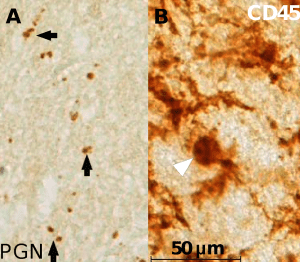

This remarkable observation came about as part of a study to determine if AIDS, a disease known to damage the blood-brain barrier, might lead to the presence of bacteria in the brain. Autopsy-derived cerebral white matter was obtained from AIDS patients; controls included material from individuals who died of other causes (including cerebral infarction, meningitis, and encephalitis), and also brain tissue collected during surgical resection for epilepsy. Total RNA was prepared, copied into DNA, and subjected to massively parallel sequencing. The results showed that all patient samples contain sequence tags for alpha-proteobacteria (>70% of bacterial sequences). Other bacteria representing 30% of the sequences were not universally present. Alpha-proteobacteria do not predominate in other body sites where the microbiomes are dominated by Firmicutes, Bacteriodetes and Actinobacteria. Staining of sections of human brain with antibodies to peptidoglycan, a component of the bacterial cell wall, suggest that the bacteria are localized mainly in glia (photograph).
To demonstrate that live alpha-proteobacteria are present in the brain specimens, homogenates of brain samples were prepared and inoculated intracerebrally into immunocompromised mice. Sequence analysis of mouse brain RNA done seven weeks later revealed mainly alpha-proteobacteria. Transfer of the bacteria was not observed after heat-treatment of the brain homogenate.
Some viral sequences were also detected in human brain samples. Human herpesvirus-6, Epstein-Barr virus, cytomegalovirus, and coronavirus nucleic acids were detected in some but not all patient samples, while varicella-zoster virus, herpes simple virus type 1, and Saffold virus were not detected in any specimens.
The presence of bacteria in human brain, regardless of underlying disease process, is remarkable. One explanation for this finding might be that soon after death, bacteria invade the brain. This scenario seems unlikely as the findings indicate that the bacteria present in the human brain do not appear to be derived from other body sites. Some of the many questions that come to mind include: Are brain bacteria beneficial, like other components of our microbiome? Is the brain microbiome present at birth or acquired? Do alterations of the brain microbiome lead to human neurological diseases?
We discussed this seminal paper on episode #58 of the science show This Week in Microbiology. Listen to this episode at microbeworld.org and hear our amazement as the story unfolds.

This looks really interesting and has so much promise for future research! It is amazing how much the immune system and now possibly bacterial communities may play a role in the functioning of our brain. Although, I would like to see more proof of bacterial presence in the brain from future studies to confirm these results.
Pingback: #microtwjc week 30 – bacteria in our brains…? | Microbiology Twitter Journal Club
http://virtual-microbiology.blogspot.com/
un blog excellent, bravo.
Pingback: Sunday Papers: The Shyer and Spryer Mouse | The Tangled Woof of Fact
This could inform research into Chronic Fatigue Syndrome-this seems to support new research on neuroinflammation and the role of commensal bacteria in CFS.
I’m schizophrenic and it makes me worry I have parasitic brain bacteria living off me, I did get very bad acne as a child and years after so am vulnurable to bacteria.
Not to freak you out but yes if you have schizophrenia which was not drug induced you probably do have bacteria upsetting your neurology. I have Neurroborreliosis which is why I’m on this site, so I know I have bad bacteria in my brain but am confident I can drive it out, and replace it with beneficial bacteria.